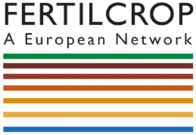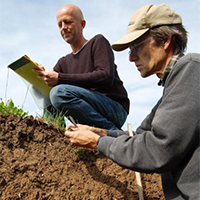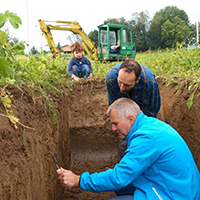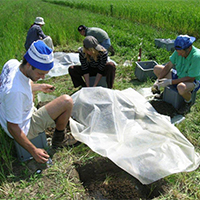FertilCrop
Fertility building management measures in organic cropping systems
Background
Improving the productivity of organic farming systems is highly important for the development of a more sustainable food and feed supply and for safeguarding the soil and other limited resources, which future food production depends on. We need to understand better the dynamics of nutrients and humus and the functional role of the living soil in order to manage soils to support crop growth.
Main project activities
FertiCrop focuseson the interactions of crops with:
- the accompanying vegetation;
- soil organisms that build soil structure; and
- microorganisms that indicate soil fertility and drive the nutrient dynamics
Improved systems will be tested with:
- modeling tools to predict crop growth; and
- farm prototyping exercises.
In FertilCrop we will also develop field tests for farmers to evaluate soil quality.
Benefits and results
Expected societal benefits of the project
FertilCrop is a transnational research project that makes use of the wide-ranging knowledge on soil management from the 13 participating countries. New and existing field studies from the 20 research partners across Europe are used. The fragmented infrastructure across the participating countries will be compiled at the level of field experiments, weed, crop, and soil analyses and computer-based modelling. The project team comprises expertise from various disciplines that are relevant to develop, evaluate, and disseminate new agricultural management techniques.
The farmers are in the focus of this project, and their opinion on our approaches will be included. We will share our novel ideas and research results with them. In the view of soil fertility loss worldwide, this project is timely and will provide new insights into better soil management for the future production of food and feed.
Expected outcomes, results and impact
In FertilCrop, we are combining scientific and practical knowledge for the further improvement of organic cropping systems. FertilCrop will help to increase and stabilize yields in an environmentally friendly way and to close yield gaps between organic and conventional farming. It will provide strategies to improve and techniques to recognize soil fertility while protecting the environment.
Combining improved management techniques will help farmers to overcome the barriers to adopting organic farming practices. Depending on the physical and climatic environment, techniques such as reduced tillage, green manures, adapted crop rotations, and mixed cropping will contribute to a better use of the biological processes governing the ecological services of agroecosystems.
Expected long-term impact
FertilCrop will implement the European Soil Thematic Strategy and will promote the development of the organic sector in Europe in a more productive and environmentally friendly way as a result of knowledge gains in the domain of crop-soil interactions. We expect that the management options and diagnostic tools adapted to on-farm use that FertilCrop is aiming to provide will help the farmers to find the best decisions for their local situations.
How to reach target groups
Results of FertilCrop will be discussed with farmers at field days and disseminated via the internet and print media. New insights that are deemed useful to the farming community will be transferred to the practice directly through the participating farmer groups and by aiming at speeding up the scientific publication process.
Project partners
Paul Mäder, Research Institute of Organic Agriculture, Switzerland, paul.maeder@fibl.org
Jørgen Olesen, Aarhus University, Denmark, jeo@agro.au.dk
Ton Baars, Fundacja im. Stanisława Karlowskiego, Poland, ton.baars@juchowo.org
Paolo Bàrberi, Scuola Superiore Sant’Anna, Italy, paolo.barberi@sssup.it
Daniele Antichi, Centro di Ricerche Agro-Ambientali « Enrico Avanzi », Italy, daniele.antichi@avanzi.unipi.it
Joséphine Peigné, ISARA Lyon, France, jpeigne@isara.fr
Cristian Gary, INRA-SUPAGRO, France, gary@supagro.inra.fr
Jarosław Stalenga, Institute of Soil Science and Plant Cultivation, Poland, stalenga@iung.pulawy.pl
Marjetka Suhadolc, University of Ljubljana, Slovenia, Marjetka.Suhadolc@bf.uni-lj.si
Anne Luik, Estonian University of Life Sciences, Estonia, Anne.Luik@emu.ee
Maria Stenberg, Swedish University of Agricultural Sciences, Sweden, maria.stenberg@slu.se
Žydrė Kadžiulienė, Lithuanian Research Centre for Agriculture and Forestry, Lithuania, zkadziul@lzi.lt
Anamarija Slabe, Institute for Sustainable Development, Slovenia, anamarija.slabe@itr.si
Jordi Doltra Bregon, Cantabrian Agricultural Research and Training Centre, Spain, jordidoltra@cifacantabria.org
Ron de Goede, Wageningen University, The Netherlands, ron.degoede@wur.nl
Sissel Hansen, Bioforsk, Norway, sissel.hansen@bioforsk.no
Concetta Vazzana, Università degli Studi di Firenze, Italy, concetta.vazzana@unifi.it
Margrethe Askegaard, Seges P/S, Denmark, MGA@seges.dk
F. Xavier Sans Serra, Universitat de Barcelona, Spain, fsans@ub.edu
Associated project :
Michael Schloter, Helmholtz Centre Munich, Germany, schloter@helmholtz-muenchen.de
More about the project
Coordinator of FertilCrop
- Andreas Fliessbach,
FiBL, Departement für Bodenwissenschaften
Mail: andreas.fliessbach@fibl.org





The project FertilCrop "Fertility Building Management Measures in Organic Cropping Systems" is funded by ERA-Net CORE Organic Plus Funding Bodies partners of the European Union’s FP7 research and innovation programme under the grant agreement No. 618107.
